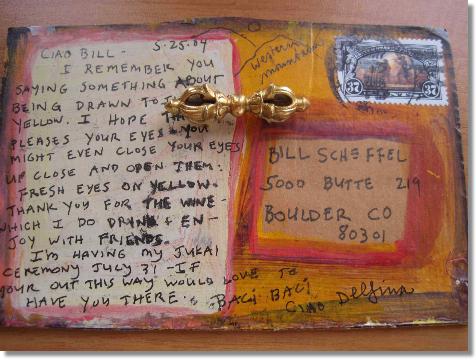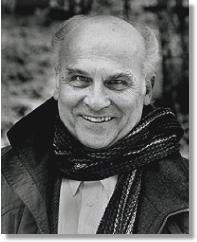 |
|
CHANCE SYNCHRONICITY & MIND-WRITING:
Write About About Money and/or Secrets

Finally, an opportunity presented itself to go to Onitsha. Now, sitting in the car, I tried to imagine how everything there must look, my mind monstrously multiplying images of markets I had seen, blowing them up many times over until they had attained the proportions of the largest marketplace in the world. My driver was called Omenka and belonged to the shrewd and crafty people raised among the riches of the local oil fields, people who know what money is and exactly how to extract it from their passengers. On the day we first met, I gave him nothing as we parted. He walked away without so much as a good-bye. I dislike cold, formal relations between people and I felt bad. So the next time I gave him 50 naira (the local currency). He said good-bye, and even smiled. Encouraged, I gave him 100 naira the following time. He said good-bye, smiled, and shook my hand. At the subsequent parting, I gave him 150 naira. He said good-bye, smiled, wished me well, and warmly shook my hand, grasping it in both of his. The next time I raised the rate again and paid him 200 naira. He said good-bye, smiled, shook and squeezed my hand, asked me to pay his respects to my family, and with concern in his voice inquired after my health.
Without stretching this story out any longer, suffice it to say that I ended up showering him with so many naira that we were simply unable to part. Omenka’s voice was always trembling with emotion, and with tears in his eyes he would swear his everlasting devotion and fidelity
I had what I wanted, and more: tenderness, warmth, goodwill.
from The Shadow of the Sun, Ryszard Kapuściński
PRESSURE
I have no idea how many wallets I've worn out. About thirty-five years of wallets I guess, since I first carried one in seventh grade. What is certain is where I keep my wallet: right back pocket. Perhaps thirty-five years of sitting on my wallet - tilted slightly leftward - has altered my posture. The sensation of wallet in my pants is reassuring - in the back of my mind I look for that sensation. Wallets wear out where they bend. The amount of US currency in my wallet can sometimes be so thick my wallet barely folds. The thick wallet increases the sensation on my hip and makes the back of my mind even more alert to its presence. Sometimes my wallet is thick with movie tickets, shopping lists, grocery receipts and assorted business cards. My mind recognizes this thickness is not of value and sends another signal: take that junk out of your wallet. A thin wallet folds easily lasts longer and is the personal equivalent of an uncluttered closet or desk drawer. I like the feeling of crisp bills in my wallet. In recent years, I've begun to keep the bills in my wallet sorted in ascending order. Occasionally I'll carry a hundred dollar bill. Sometimes I'll exchange twenty dollar bills for a hundred. I feel richer with a single hundred than five twenties, not to mention the thinner wallet. Paying cash also increases my sense of wealth. Now I only use cash. When I wrote checks I felt cheap - as if the checks were saying, "I have no money - or if I do, I can't keep it in my wallet for long." The cash exchange is swift and final. Nothing is pending, no ID is required. You don't keep the people behind you waiting in line any longer than necessary. Besides cash my wallet holds my driver's license. I had high hopes for the photograph on my last driver's license. My haircut was good and the woman who took the photograph was surprisingly friendly. But I choked at the last minute, clenched my jaw, stared vacantly. The shadows from the flashbulb made my face look round and wide, whereas it's anything but. The picture's a dog. And I'll be looking at it for five more years.
12-feb:02
Bill Scheffel
SECRET
Lewis Warsh
I tell people my secrets in the hope that they’ll tell me theirs. People think I’m an attentive listener but the only reason I talk to people is to use what they say in my writing. I ask people about the first time they fell in love, or went to bed with someone. I ask people about their diseases. Their addictions. I get them to tell me things they never told anyone else. “I once hired a hit-man to kill my mother,” she says, “but it all fell through at the last minute.” “I slept with my shrink,” she says. “I never told anyone this before.” Maybe you’ll recognize yourself in some of my stories, maybe not. Maybe everybody’s stories are the same. Teeth. Everyone has problems with their teeth, but these aren’t the stories I’m interested in. Root canals. Periodontal work. “I had an affair with my dentist,” she says. “I never told anyone this before.” She was the last patient of the day and he locked the door of his office behind him. There was a couch in a room behind his office, away from the bright lights and the X-ray machines and the plastic gloves. She had the feeling that she wasn’t the first patient he had seduced. “I leaned over the arm of the couch and he lifted my skirt,” she said. Sometimes people tell you more than you want to know. I had simply asked if she could recommend a dentist and this is what she told me. The affair with her dentist lasted three years. After he finished work on her teeth, they began meeting twice a week at a hotel near his office. They met during his lunch hour and eventually he left his wife and children. “But we never lived together,” she said. I wanted to ask “why” but I had already heard too much. I was taking tylenol with codeine for the pain in my tooth and I was conscious of our thighs touching as we sat side by side in the booth in the back of the bar. It was closing time. I could imagine walking her home, climbing the stairs to her apartment, and making love to her without taking off my clothes. But then I remembered my wife, waiting at home, waiting up for me in our bed reading a book, and I didn’t want to walk through the door with a secret of my own. She was reading one of the long later novels by Henry James, The Wings of the Dove, I think. She was on page 320. My wife likes to talk about the books she’s reading and I was familiar with The Wings of the Dove, I’d read it in college, but I had forgotten the story, so hearing my wife talking about it was like rereading it. And I know I’ll never have time to reread it. What I read, as I get older, what I tend to enjoy reading, are biographies, life stories of people who overcame adversity, who performed heroic deeds under the worst circumstances, exile and imprisonment. I recently read a biography of Chairman Mao which had mostly do with his sex life. Apparently, at all state functions, there was a room where Mao could go for a “rest,” accompanied by two or three of his favorite consorts. I also read a biography of Bertold Brecht which claimed that Brecht didn’t write any of his major plays. That he had a group of women, his lovers, who wrote the plays. Elizabeth Hauptman. Ruth Eisler. There were others as well. Brecht always had two or three girlfriends at the same time. It seems odd to me that we remember Brecht’s name but we don’t remember the names of his collaborators. That he didn’t even give these women credit for their work. That he cheated them out of royalties. That he never wrote a good play after they grew bitter and stopped working for him. They were in love with him and that’s what inspired them to do his work and let him sign his name to the work they had written. They thought he would love them more, but he jilted them all instead. I get into bed beside my wife and rest my head on the pillow while she continues to read. My wife and I have been married for fifteen years and sometimes we read aloud to one other before going to sleep. The main secret of our marriage is that she had an affair with another woman which lasted five years, and that half that time we lived separately from one another. But we’re well passed the point where we talk about this anymore, though for a long time, even after the affair ended, it was our main topic of conversation. “How’s your tooth?” my wife asks. “It hurts,” I say. “I’m going to the dentist tomorrow.” And then she says: “Let me read this to you.” I close my eyes and listen to the voice that begins and ends every one of my days, surrendering to the convoluted hum of sentences with no boundaries until my own thoughts are a blur of clouds and shadows on the distant horizon. Memories, secrets, all my fantasies--everything fades under the hypnotic sway of my wife’s voice--until all that remains is the dull pain in the side of my mouth.

For Ryszard Kapuscinski, who has died aged 74, journalism was a mission, not a career, and he spent much of his life, happily, in uncomfortable and obscure places, many of them in Africa, trying to convey their essence to a continent far away. No one was more surprised than him when, in his mid-40s, he suddenly became extremely successful, with his books translated into 30 languages. He won literary prizes in Germany, France, Canada, Italy, the US, and was made journalist of the century in Poland.
Kapuscinski was born in Pinsk, now in Belarus, and in 1945 was taken to Poland by his mother, searching for his soldier father. War as the norm for life was deep in his young psyche after those early years of ceaseless hunger, cold, sudden deaths, noise and terror, with no shoes, no home, no books in school. Decades later he wrote: "We who went through the war know how difficult it is to convey the truth about it to those for whom that experience is, happily, unfamiliar. We know how language fails us, how often we feel helpless, how the experience is, finally, incommunicable." - The Guardian, read more...
![]()
